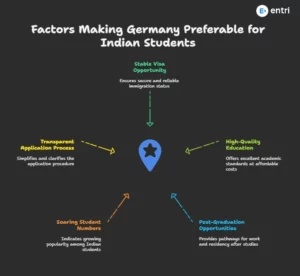Table of Contents
“What’s the best study destination for Indian students?” A group said the UK! Another said the US! But those who were actual students said in unison that Germany is the best student destination for students, currently! This blog tells you why everyone is making their move towards Germany over the UK and the US.
Check out this video by Entri in Malayalam!
Summary:
- Germany is becoming a top choice for Indian students seeking education abroad.
- According to the German Embassy, the applications from Indian students have seen a surge in recent months.
- Stable visa rules and low tuition fees are the major reasons for this spike.
- Around 50,000 Indian students are already studying in German public universities.
- Germany has expanded initiatives like English-taught programmes, student stay-back, and working opportunities.
Introduction
For a long time, the US and the UK were considered the best and relevant study destinations for Indian students. The traditional method of going abroad for studies and then settling there was predominantly established through the migration of students to these two destinations. However, fast-forward a decade, and we see a change in the preference of Indian students for choosing countries other than the US and the UK.
One of the major names that students seek admission in is Germany, and its growth and emergence as a leading choice among Indian students is nothing short of a marvel. From its stable immigration framework to its high-quality yet affordable education, the country is putting up a compelling choice for Indian students. Let us explore the reasons why Germany is becoming an educational haven for Indian students.
What Makes Germany Preferable Over Others?
1: How do you say "Good Morning" in German?
Here are the reasons why Germany is getting all the attention from Indian students:
Stable Visa Opportunity Amid Global Uncertainty
Visa policies in countries like the US and the UK have grown to be exhausting, with longer wait times and social media screenings. All these reasons resulted in a dip in the inflow percentage of Indian students. This was the case for other countries as well, including Canada and Australia. In such times, Germany has maintained a stable, transparent visa procedure that naturally makes it preferable over the countries. Additionally, with the introduction of the newly launched Consular Services Portal, Germany has digitised the process, enabling real-time tracking and faster processing, making it a major shift from slow procedures.
High Quality and Affordable Education
Most of the public universities in Germany have zero to minimal tuition fees, which contrasts with the hefty amount charged by typical North American and UK institutions. Living costs are comparatively affordable, with rent ranging roughly from €550–800 per month with shared accommodation. These costs are a main source of attraction as Indian private college fees can go up to ₹20 lakh per year.
Additionally, Germany offers a wide range of English-language degree programs – including bachelor’s, master’s, and PhD courses. Regardless of the area of learning that you are interested in, Germany offers you a path that doesn’t demand fluency in German. This resolves the students’ worries about studies being lost in translation. According to the German Ambassador, Dr. Philipp Ackermann, Germany views education as a public good and not a commercial product, which makes it a particularly attractive destination for students from countries like India, where affordability plays a key role in overseas education.
Post-Graduation Work and Residency Opportunities
Germany offers international students a 20-hour work permit per week and graduates to stay up to 18 months after their graduation to secure employment. This is an advantage that many countries lack. With Germany facing a critical shortage in STEM fields, transitioning to a work visa (or even the EU Blue Card) is more accessible than ever.
This stands in contrast to the rising uncertainty in post-study options in other major destinations, where work permits are harder to obtain or are subject to shifting political parties.
Soaring Indian Student Numbers
Dr. Ackermann stated that applications from Indian students to German universities have surged by over 35% in recent months. Additionally, as of 2025, the German Embassy in New Delhi has reported that over 50,000 Indian students are currently enrolled in German universities. This places the country as a top-five study destination among Indian students.
Transparent Application Process
Another major reason for Germany gaining a lot of traction is the clarity and accessibility of its application process. Indian students are encouraged to directly apply to German universities and access free counselling through the German Academic Exchange Service (DAAD) and the German university liaison offices in India.
Important: Most public universities operate without any private agents, and any claim otherwise should be treated with caution. This approach encourages students to apply on merit, and thus, reduces the chances of misinformation and other inflated costs through unofficial intermediaries.
Free German A1 Mock Tests – Powered by AI!
Test your skills on our interactive platform. Get instant feedback from our AI to help you communicate better and track your progress. Start your free German mock test now.
Test Your German A1 for FreeChallenges to Consider
While Germany offers a compelling and attractive package, it does come with its hurdles. Beyond the affordable education, generous work rights, and visa stability, these are some of the key challenges that Indian students should be ready to face:
-
Language Barrier
While many programmes are taught in English, life outside the classroom revolves around the German language. Every day tasks like grocery shopping, doctor visits, or government paperwork require at least basic German. Even for part-time jobs, employers usually prefer students with conversational German, especially in hospitality, retail, or customer service.
The solution is to make sure that you are versed in the basic German language. Aim for at least A2-B1 level before or during your stay. On a tight schedule? If you can squeeze 1 hour daily, you can enrol in Entri’s German language course, which guarantees B2 proficiency within 6 months. With professional mentors, exclusive study materials, online classes, and one-on-one support, Entri can make your life outside the classroom easier.
-
No More Informal Visa Appeals
Germany is phasing out the remonstration process – an informal plea or appeal to contest a rejected visa without going to court – by mid-2025. Only formal legal appeals will be allowed, which means costlier and slower appeals will be allowed for student and Schengen visas. To put it simply, if you make a mistake on your visa application, the chances of rectifying it are low and would require you to start a fresh application. Therefore, be cautious and review your application multiple times before applying or seek guidance from DAAD.
-
Competition for Popular Programmes
In recent years, top German public universities like TU Munich, RWTH Aachen, and LMU have seen application numbers exceeding the available number of seats, especially in engineering, data science, and AI. Therefore, limited intakes can leave strong candidates without admission. As a solution, apply to a mix of top, mid-tier, and applied science universities. So, ensure you meet the exact GPA, IELTS, and prerequisite course demands. This increases your probability of getting admission to a university in Germany.
Conclusion: Final Call..
Germany presents a trifecta consisting of stability, affordability, and strong career aspects, making it one of the most persuasive countries for Indian students. Its decision to digitise the visa processes and broaden the English-taught courses showcases its thoughtfulness for international students. Despite the upcoming stricter appeal procedures and language demands, Germany remains a top alternative for international students, especially when the traditional destinations are narrowing their entry.
With the German language course from Entri, students can turn the education opportunity provided by Germany into a bridge for global careers!
Free German A1 Mock Tests – Powered by AI!
Test your skills on our interactive platform. Get instant feedback from our AI to help you communicate better and track your progress. Start your free German mock test now.
Test Your German A1 for FreeFrequently Asked Questions
Is studying in Germany really free?
Yes—most public universities in Germany charge no tuition fees for bachelor’s and many master’s programs, even for international students. You may need to pay a semester contribution (around €100–€350 ≅ ₹10,000 – ₹30,000), which often includes public transport.
Do I need to know German to study in Germany?
Not necessarily. Germany offers over 2,300 English-taught degree programs, especially at the master’s and PhD levels. However, knowing basic German (A1–B1) is essential for daily life, part-time work, and post-study employment.
How long can I stay in Germany after graduating?
International graduates can stay for up to 18 months after completing their degree to find a job related to their field. Once employed, you can apply for a residence permit or EU Blue Card.
What are the new visa rule changes in 2025?
Starting July 2025, Germany will eliminate the informal remonstration process for student and Schengen visas. If your visa is rejected, you will have to file a formal legal appeal, which can be costly and time-consuming.
Can I work part-time during my studies in Germany?
Yes, international students can work up to 120 full days or 240 half days per year without needing a separate work permit. Part-time jobs in retail, hospitality, or tutoring are common.
Is it easy to get a job in Germany after graduation?
It depends on your field of study, German language skills, and internship experience. STEM, IT, and healthcare fields have high demand. Jobs in humanities or arts may require more effort and fluency in German.















